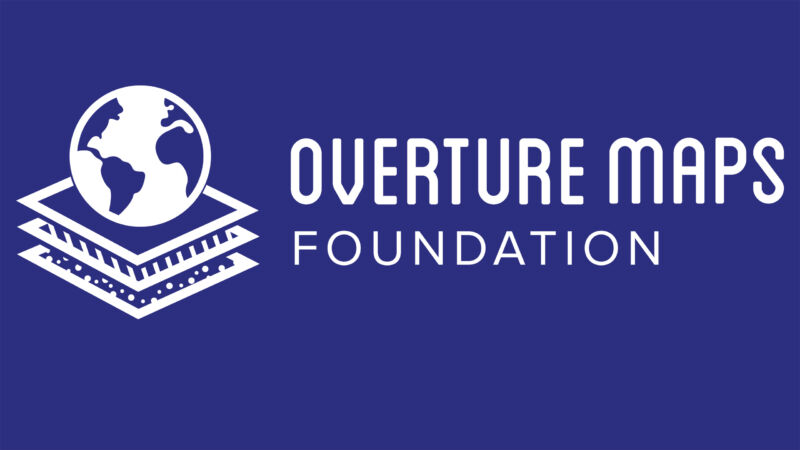
Google Maps is getting some competition. The Linux Foundation has announced Overture Maps, a "new collaborative effort to develop interoperable open map data as a shared asset that can strengthen mapping services worldwide." It's an open source mapping effort that includes a list of heavy hitters: Amazon Web Services (AWS), Meta, Microsoft, and TomTom, with the foundation adding that the project is "open to all communities with a common interest in building open map data."
The Linux Foundation has a press release about the project and a new website for the Overture Maps Foundation. The press release outlined the scope of the project, which aims to deliver:
- Collaborative Map Building: Overture aims to incorporate data from multiple sources including Overture Members, civic organizations, and open data sources.
- Global Entity Reference System: Overture will simplify interoperability with a system that links entities from different data sets to the same real-world entities.
- Quality Assurance Processes: Overture data will undergo validation to detect map errors, breakage, and vandalism to help ensure that map data can be used in production systems.
- Structured Data Schema: Overture will define and drive adoption of a common, structured, and documented data schema to create an easy-to-use ecosystem of map data.
If you're saying, "Wait! isn't there already an open source map community out there?" There is, and it's called "OpenStreetMap," the Wikipedia of maps that anyone can edit. The Overture press release says, "The project will seek to integrate with existing open map data from projects such as OpenStreetMap and city planning departments, along with new map data contributed by members and built using computer vision and AI/ML techniques to create a living digital record of the physical world."
One of the Overture site FAQs asks about OpenStreetMap and its relationship to Overture: "Overture is a data-centric map project, not a community of individual map editors. Therefore, Overture is intended to be complementary to OSM. We combine OSM with other sources to produce new open map data sets. Overture data will be available for use by the OpenStreetMap community under compatible open data licenses. Overture members are encouraged to contribute to OSM directly."
It sounds like the Overture Foundation is unhappy with the OpenStreetMap data structure and wants to clean things up, saying, "Open map data can lack the structure needed to easily build map products. Overture will define and drive adoption of a common, well-structured, and documented data schema to create an easy-to-use ecosystem of map data."
Breaking the yoke of the Google Maps API
All this data and interoperability talk makes this project seem aimed more at the Google Maps API rather than the consumer-level navigation app. All of Google's mapping data is in the consumer app, but it's also up for grabs to developers via the Google Maps API. The API lets them embed a map into a project and draw a UI around it, or they can query the Google Maps database for specific info. For services like rideshares, shippers, food delivery services, and flight tracking, they often just want to show a map without having to worry about mapping the entire world and keeping it up to date. The Google Maps API lets any developer embed the world-class Google Maps dataset into their app, provided they're willing to pay a hefty price.
The Maps API started as a low-priced service that enticed companies to build a business on top of Google's API, but since Google's rise to mapping dominance, it has put the screws to developers with anti-competitive terms and rising prices. In 2018, Google Maps hiked the price by more than 1,400 percent, and many developers were forced to stop using Google Maps or go bankrupt. The US Justice Department began an investigation of Google Maps earlier in the year over concerns about car app bundling and anti-competitive terms of service. Google prohibits Maps API customers from "Re-Creating Google Products or Features," which is an impossible standard for a company as big as Google and would potentially mean a developer would have to shut down if one day Google launches a competing project. It also bans combining Google Maps data with any other dataset and completely bans its use in cars.If Overture Maps succeeds, it could lower costs for everyone. Overture member companies are expected to pay an annual membership fee to the foundation, with members on the "Steering" tier paying $3 million per year and dedicating 20 engineers to the project (sign-ups are currently open). That's nothing compared to what a big company will pay for access to the Google Maps API. When Uber held its IPO in 2019, the company reportedly paid $58 million for Google Maps API access over the previous three years, and that was mostly before the Google Maps price hike. $3 million a year is a bargain compared to that.
Stay tuned for a first-half 2023 launch
Overture says it will "release its first datasets in the first half of 2023" and "share more details as soon as we’re ready."
The code to "help developers process and effectively use Overture map data and the global entity reference system" will eventually be on GitHub. Initially, the foundation aims to release "basic layers including building, road, and administrative information," with later plans to introduce "new layers such as places, routing or 3D building data."
reader comments
152